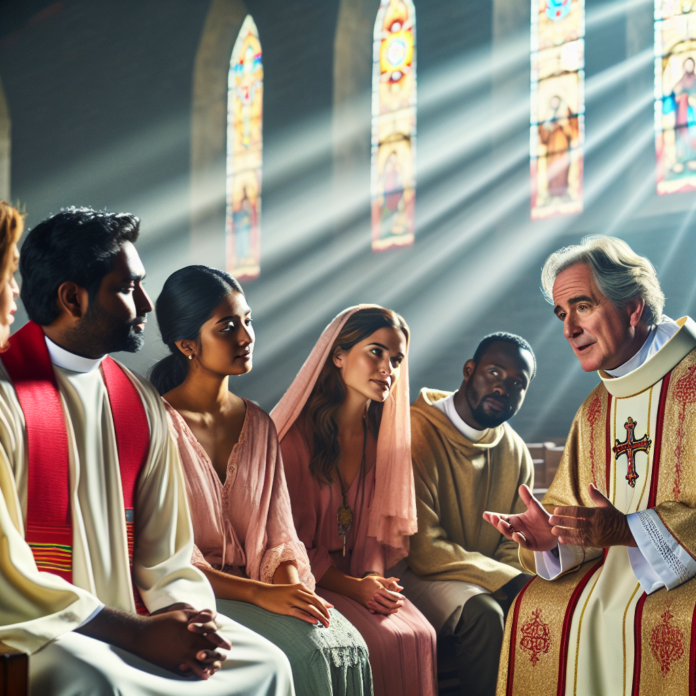Divine Democracy: Priests and Catholic Voting Habits
In the complex and multifaceted world of politics and religion, the influence of Catholic priests on voting habits provides significant insight into broader societal trends. The dichotomy between more traditionalist factions and progressive elements within the Church offers a rich narrative about not only where Catholicism has been but where it might be heading. As society evolves, so too must its institutions, and the Church’s relationship with politics is undoubtedly part of this evolutionary dance.
Historical Context
Historically, the relationship between Catholicism and voting practices has been one marked by a certain rigidity. The early to mid-20th century saw priests vocally guiding their congregations toward candidates and policies that mirrored conservative values. This tendency aligned well with the broader cultural atmosphere of the time, where conformity and adherence to traditional structures were the norm.
Such traditionalism was not only reflected in voting habits but also in the liturgy itself. The Latin Mass, a symbol of immutable tradition, prevented many believers from accessing religious texts in their own language and engaged in a form of worship that often estranged them from the immediacy of their faith. The Mass, carried out in a language few understood, symbolized an era where the layperson’s role was to follow, not question.
The Vatican II Council: A Turning Point
However, the Second Vatican Council, held between 1962 and 1965, marked a significant shift. Its progressive reforms sought to bring the Church closer to the people, transitioning the Mass into vernacular languages and emphasizing a greater role for the laity. This democratization of worship began to influence political attitudes as well, making the faithful more active participants in their spiritual and civic lives.
The Emergence of a Progressive Church
Fast forward to the papacy of Pope Francis, and it is clear the Church is undergoing a profound transformation. His emphasis on social justice, environmental stewardship, and inclusive policies resonates deeply with progressive values. The Pope’s focus on compassion and empathy, particularly towards marginalized communities, has found a powerful echo in a world increasingly aware of social inequalities. For many, Pope Francis represents a refreshing departure from the rigid dogmas of the past, providing a spiritual endorsement of equality and progressive change.
Catholic Voting Patterns in the Modern Era
In the United States, where Catholicism significantly influences the political landscape, there has been a noticeable shift in voting patterns. Decades ago, church attendance was a reliable predictor of conservative voting habits. Today, however, the picture is more nuanced. While older, more traditionalist Catholics may still lean conservative, younger generations, inspired by the inclusive and forward-thinking message of leaders like Pope Francis, are more likely to embrace progressive policies.
Educational institutions, both Catholic and secular, have played a crucial role in this shift. Universities that once adhered strictly to conservative teachings now explore broader ethical questions around social justice, healthcare, and the environment. This intellectual awakening has permeated into congregations, making the faithful more discerning and open to progressive viewpoints.
Traditionalism vs. Progressivism
While progressive movements within the Church are gaining momentum, traditionalist elements remain a vocal minority. The resurgence of the Latin Mass in certain circles is emblematic of this resistance. For these groups, the Latin Mass is not merely about linguistic preference but a deeper desire to preserve what they see as the immutable truths of the Church. However, this rigidity often clashes with the need for the Church to remain relevant in an ever-changing world.
It is essential to recognize that traditionalism, while often rooted in a sincere desire to maintain a connection with the past, can sometimes hinder growth. In an era where inclusivity and open dialogue are increasingly valued, a retreat into rigid structures can alienate potential adherents. The Church must, therefore, navigate this tension carefully, balancing respect for tradition with the need for progress.
Looking Forward: The Role of Priests
The role of priests in shaping voting habits remains as significant as ever. Progressive priests, inspired by the inclusive vision of Pope Francis, are more likely to encourage their congregants to consider broader ethical implications in their voting choices. They stress the importance of social justice, environmental responsibility, and compassion in political decisions.
Conversely, traditionalist priests often emphasize issues like abortion and religious freedom, sometimes at the expense of a more comprehensive ethical framework. This narrow focus can overshadow other critical issues such as poverty, healthcare, and climate change, which are equally deserving of moral consideration.
Conclusion
The evolving voting habits among Catholics reflect a broader dialogue within the Church about its role in modern society. The balance between traditionalism and progressivism is a delicate one, but the Church’s future seems to lie in its ability to adapt and embrace a more inclusive, compassionate approach, as epitomized by Pope Francis.
As societal values shift towards greater empathy and inclusivity, it is incumbent upon the Church to reflect these changes. By doing so, it not only remains relevant but also fulfills its spiritual mission in a world in desperate need of compassion and justice. In this delicate dance between past and future, the Church has the opportunity to lead, rather than follow, in the quest for a more just and equitable society.
